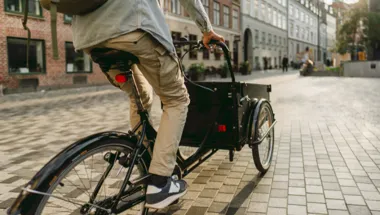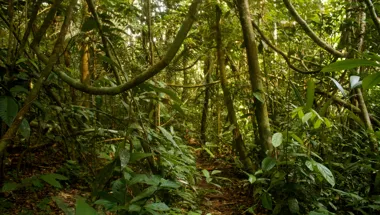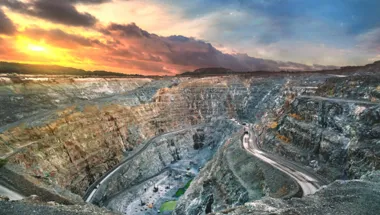We’re delighted to announce the winners of the third round of the King’s Climate & Sustainability Seed Fund, which was open in early 2024.
Six research projects tackling a range of pressing issues relating the climate crisis have been awarded more than £226,000 of funding. These projects seek to scale-up novel and distinctive knowledge on a range of innovative and interdisciplinary topics.
These projects were selected for their potential to lead onto larger-scale programmes that respond to vital and urgent global challenges, as well as attracting external funding and challenging existing thoughts and practices across the industry.
Projects

Anticipating and regulating impacts of Drone Delivery Fleets to urban noise, energy consumption, and wellbeing inequalities
Drones are unmanned aerial vehicles that can carry low-weight goods while avoiding traffic. While excitement for drone delivery-fleet technology is running high, the physical, social, and environmental impacts associated with scaling up such systems remain undetermined. This project aims to anticipate the impact of drone fleets on urban sustainability and investigate how regulation can alleviate such impacts. The work will focus on the city of London, integrating datasets on noise and spatially mapped population indicators. The team will gather stakeholders’ perceptions and map the existing regulatory landscape to inform future research. This project brings together King’s existing research strengths in robotics, urban informatics, noise pollution and physical and mental health, qualitative research and inequalities, and environmental law to begin to address this multi-disciplinary problem. Collaborators: Ioannis Bakolis and Gabrielle Samuel External partner: Tom White

Nanostructured Transparent Electrodes for Semi-Transparent Solar Cells
Agriculture and the food supply chain contribute approximately 20% of the UK's CO2 equivalent emissions. An innovative solution to reduce these emissions is agrivoltaics, which combines agricultural practices with photovoltaic technology to meet both energy and food demands simultaneously. This project aims to design and produce nanostructured transparent electrodes that balance the need for maximum light transparency, crucial for crop growth, with the need for high conductivity to enable efficient photovoltaic performance. This initiative brings together leading experts in perovskite thin-film semiconductor technology, agricultural science, and glass manufacturing to explore and advance the applications of next-generation solar cells. By combining these fields, the project aims to make significant strides in sustainable food production and renewable energy generation. External partners: Dr Neil McSporran from Pilkington NSG and Professor Simon Pearson from University of Lincoln

Logistics for Sustainable Urban Deliveries with Cargo Bikes
Demand for deliveries in urban environments is increasing. Cargo bikes offer a pathway to environmentally more friendly urban deliveries. This project aims to enhance the viability, reliability, and operation of urban delivery services with cargo bikes as an alternative to motor vehicles. The team will create resources, such as clean/pre-processed data with documentation, preliminary probabilistic modelling for estimating accident risk, and specification of routing, scheduling, and maintenance problems. Prototypes of logistics optimisation models will incorporate subject matter expertise of industrial partners for impact, and insights of social sciences for addressing driver needs. These resources will be exploited to answer questions relevant to the efficiency, area coverage, and safety of urban deliveries with cargo bikes. The project will also include workshops and regular meetings to develop a broader research agenda on sustainable transport with bikes. External Partners: Douglas Leroy (Peddle My Wheels & OurBike), Scott Cain (Bicycle Association), Prof Tibor Petzoldt (TU Dresden), Dr Madlen Ringhand (TU Dresden), Dr Yin Lu (University of Aberdeen).

Power dynamics and knowledge hierarchies in forest governance
There is growing evidence that investments in forest-based climate solutions are disconnected from local needs and priorities, excluding women and indigenous knowledge from decision-making and risking undermining effectiveness, but also reversing past gains towards participatory forestry. This project will contribute to ensuring that externally-funded forest governance initiatives are effective in tackling climate change and sustainability, at the same time as being equitable and responsive to local communities. With a multidisciplinary team, the project will draw on the valued expertise of both Global North and Global South partners to understand power dynamics and knowledge hierarchies in externally funded forest governance programming. With a series of co-creation workshops, the project aims to inform future research and grant applications, to bring benefits to national and international policy makers, local communities and global citizens. CoI: Kate Schreckenberg

Strategic green minerals: follow the object approach for value chain analysis
There is emerging evidence that new mining extractivism is reproducing historical patterns of global inequality, environmental harm and spatial enclaves in the countries of origin. This presents a risk that the Net Zero society and ‘just transition’ concept will emerge as a luxury for the Global North. This research will explore the displacement of communities from mining sites of strategic metals critical to the energy transition such as ilmenite, lithium, cobalt, palladium, rhodium, and cadmium. Building on previous partnerships in South Africa and Zimbabwe, the research will map and analyse the social and ecological impacts, conflicts, and opportunities associated with the green transition. It will generate new knowledge of the minerals supply chain, including value chain analysis, alongside demand management practices that could improve global justice outcomes. This research will also inform firms and policy makers in the UK, who currently largely fail to consider supply chain aspects in Environmental, Social and Governance (ESG) evaluations. External partner: Patrick Bond

Towards Green(er) AI: Exploring the effect of carbon-trackers in Machine Learning teams
As the application of Machine Learning (ML) is increasing in complexity and spreading across multiple domains, its environmental impact is becoming significant. Therefore, there is an acute need to document, analyse and mitigate this impact. This project aims to develop user-centred eco-feedback methods, to support ML teams with environmental considerations throughout the ML pipeline, in a sustainability-by-design manner. Using two tracking tools developed by members of the team (Carbontracker and Green Algorithms), the project will be probing ML developers and researchers’ understanding of environmental sustainability related to their work and implications for decision-making. The funding will help to establish and consolidate partnerships and will leverage the already strong track record of Artificial Intelligence research at King’s College London. CoIlaborator: Dr Gabrielle Samuel External Partners: Dr Raghavendra Selvan and Dr Loïc Lannelongue
Projects

Anticipating and regulating impacts of Drone Delivery Fleets to urban noise, energy consumption, and wellbeing inequalities
Drones are unmanned aerial vehicles that can carry low-weight goods while avoiding traffic. While excitement for drone delivery-fleet technology is running high, the physical, social, and environmental impacts associated with scaling up such systems remain undetermined. This project aims to anticipate the impact of drone fleets on urban sustainability and investigate how regulation can alleviate such impacts. The work will focus on the city of London, integrating datasets on noise and spatially mapped population indicators. The team will gather stakeholders’ perceptions and map the existing regulatory landscape to inform future research. This project brings together King’s existing research strengths in robotics, urban informatics, noise pollution and physical and mental health, qualitative research and inequalities, and environmental law to begin to address this multi-disciplinary problem. Collaborators: Ioannis Bakolis and Gabrielle Samuel External partner: Tom White

Nanostructured Transparent Electrodes for Semi-Transparent Solar Cells
Agriculture and the food supply chain contribute approximately 20% of the UK's CO2 equivalent emissions. An innovative solution to reduce these emissions is agrivoltaics, which combines agricultural practices with photovoltaic technology to meet both energy and food demands simultaneously. This project aims to design and produce nanostructured transparent electrodes that balance the need for maximum light transparency, crucial for crop growth, with the need for high conductivity to enable efficient photovoltaic performance. This initiative brings together leading experts in perovskite thin-film semiconductor technology, agricultural science, and glass manufacturing to explore and advance the applications of next-generation solar cells. By combining these fields, the project aims to make significant strides in sustainable food production and renewable energy generation. External partners: Dr Neil McSporran from Pilkington NSG and Professor Simon Pearson from University of Lincoln

Logistics for Sustainable Urban Deliveries with Cargo Bikes
Demand for deliveries in urban environments is increasing. Cargo bikes offer a pathway to environmentally more friendly urban deliveries. This project aims to enhance the viability, reliability, and operation of urban delivery services with cargo bikes as an alternative to motor vehicles. The team will create resources, such as clean/pre-processed data with documentation, preliminary probabilistic modelling for estimating accident risk, and specification of routing, scheduling, and maintenance problems. Prototypes of logistics optimisation models will incorporate subject matter expertise of industrial partners for impact, and insights of social sciences for addressing driver needs. These resources will be exploited to answer questions relevant to the efficiency, area coverage, and safety of urban deliveries with cargo bikes. The project will also include workshops and regular meetings to develop a broader research agenda on sustainable transport with bikes. External Partners: Douglas Leroy (Peddle My Wheels & OurBike), Scott Cain (Bicycle Association), Prof Tibor Petzoldt (TU Dresden), Dr Madlen Ringhand (TU Dresden), Dr Yin Lu (University of Aberdeen).

Power dynamics and knowledge hierarchies in forest governance
There is growing evidence that investments in forest-based climate solutions are disconnected from local needs and priorities, excluding women and indigenous knowledge from decision-making and risking undermining effectiveness, but also reversing past gains towards participatory forestry. This project will contribute to ensuring that externally-funded forest governance initiatives are effective in tackling climate change and sustainability, at the same time as being equitable and responsive to local communities. With a multidisciplinary team, the project will draw on the valued expertise of both Global North and Global South partners to understand power dynamics and knowledge hierarchies in externally funded forest governance programming. With a series of co-creation workshops, the project aims to inform future research and grant applications, to bring benefits to national and international policy makers, local communities and global citizens. CoI: Kate Schreckenberg

Strategic green minerals: follow the object approach for value chain analysis
There is emerging evidence that new mining extractivism is reproducing historical patterns of global inequality, environmental harm and spatial enclaves in the countries of origin. This presents a risk that the Net Zero society and ‘just transition’ concept will emerge as a luxury for the Global North. This research will explore the displacement of communities from mining sites of strategic metals critical to the energy transition such as ilmenite, lithium, cobalt, palladium, rhodium, and cadmium. Building on previous partnerships in South Africa and Zimbabwe, the research will map and analyse the social and ecological impacts, conflicts, and opportunities associated with the green transition. It will generate new knowledge of the minerals supply chain, including value chain analysis, alongside demand management practices that could improve global justice outcomes. This research will also inform firms and policy makers in the UK, who currently largely fail to consider supply chain aspects in Environmental, Social and Governance (ESG) evaluations. External partner: Patrick Bond

Towards Green(er) AI: Exploring the effect of carbon-trackers in Machine Learning teams
As the application of Machine Learning (ML) is increasing in complexity and spreading across multiple domains, its environmental impact is becoming significant. Therefore, there is an acute need to document, analyse and mitigate this impact. This project aims to develop user-centred eco-feedback methods, to support ML teams with environmental considerations throughout the ML pipeline, in a sustainability-by-design manner. Using two tracking tools developed by members of the team (Carbontracker and Green Algorithms), the project will be probing ML developers and researchers’ understanding of environmental sustainability related to their work and implications for decision-making. The funding will help to establish and consolidate partnerships and will leverage the already strong track record of Artificial Intelligence research at King’s College London. CoIlaborator: Dr Gabrielle Samuel External Partners: Dr Raghavendra Selvan and Dr Loïc Lannelongue
Contact us
Get in touch if you would like to learn more about sustainability and climate action at King's, have a question or would like to collaborate.
